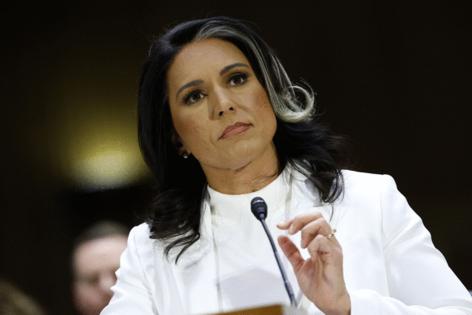Gabbard alleges Democratic 'conspiracy' in 2016 election
Published in Political News
WASHINGTON — The top U.S. intelligence official declassified an email trove purporting to expose a Democratic conspiracy to cast doubt on Donald Trump’s 2016 election win, just as his team seeks to defuse criticism over its handling of files linked to financier Jeffrey Epstein.
Director of National Intelligence Tulsi Gabbard said the 114 pages of heavily redacted emails reveal that former President Barack Obama’s national security Cabinet faked and manipulated intelligence behind the assessment that Russia wanted Trump to win the election.
In a press release, Gabbard said the information “clearly shows there was a treasonous conspiracy in 2016 committed by officials at the highest level of our government.” She called for an investigation and prosecution of those involved, “no matter how powerful,” and said on X that the documents would be turned over to the Department of Justice.
Gabbard’s claim stands in contrast to the findings of a bipartisan Senate investigation that ended in 2020 and the conclusion of a Central Intelligence Agency review released earlier this month. That review faulted some aspects of a 2017 assessment on Russian interference but stood by the conclusion that Moscow wanted Trump to win in 2016.
“The unanimous, bipartisan conclusion was that Russia interfered in the 2016 election to benefit Donald Trump,” Senator Mark Warner, the ranking Democrat on the Senate Intelligence Committee, said in a statement after Gabbard released the emails.
Among other senators on the committee who signed off on the report was Marco Rubio, now Trump’s secretary of state and acting national security adviser, who said at the time the investigation found “irrefutable evidence of Russian meddling.”
“This is just another example of the DNI trying to cook the books, rewrite history, and erode trust in the intelligence agencies she’s supposed to be leading,” Warner said.
Gabbard’s move hearkens back to a claim from the early days of Trump’s first presidency — and one he has repeated many times since then — that the assessment Russia wanted him to win was a conspiracy by Democrats to bring him down.
But the declassified files from nearly 10 years ago aren’t the ones that Trump supporters have been pining for in recent days.
Over the past week, Trump’s inability to convince his supporters to drop their demands for more information about the Epstein scandal has dominated the news and frustrated many in the administration. Trump’s handling of the documents, grand jury testimony and video surrounding Epstein’s trafficking of minors and his suicide in jail has divided Trump’s long-standing base.
The decision to disseminate the Russia documents was foreshadowed by Steve Bannon, Trump’s former White House chief strategist, who said in a recent interview that he understood the documents would be released and it would lead to the appointment of a special counsel that would target a grand criminal conspiracy against Trump.
“Trump’s best on offense,” Bannon said. “So he should go on offense.”
A senior intelligence official rejected any link between the release of the documents and the Epstein criticism. The person, who asked not to be named discussing confidential matters, said the declassification process had begun over a month ago and the focus should be on the deception laid out in the documents.
Gabbard framed the release in that context as well.
“The issue I am raising is not a partisan issue. It is one that concerns every American,” she wrote. “Their egregious abuse of power and blatant rejection of our Constitution threatens the very foundation and integrity of our democratic republic.”
The 114 pages of documents include heavily redacted email exchanges between officials of intelligence agencies discussing and debating the contents of an assessment on possible Russian election interference before the November 2016 election.
The release includes copies of two versions of an intelligence community assessment — a draft dated Sept. 12, 2016, saying that “foreign adversaries do not have and will probably not obtain” the ability to hack election systems, and another dated Jan. 5, 2017, concluding that “Russian President Vladimir Putin ordered an influence campaign in the summer of 2016 aimed at the U.S. presidential election.”
But Gabbard, in her conclusion around the documents, appears to be conflating separate assessments. The January report never concluded that Russia tried to hack election infrastructure — instead finding that Russia tried to undermine faith in democracy, attack Democratic candidate Hillary Clinton and show a preference for Trump.
_____
With assistance from Nancy Cook, Joshua Green, Chris Strohm, Courtney McBride, Natalia Drozdiak and Jamie Tarabay.
_____
©2025 Bloomberg L.P. Visit bloomberg.com. Distributed by Tribune Content Agency, LLC.

























































Comments